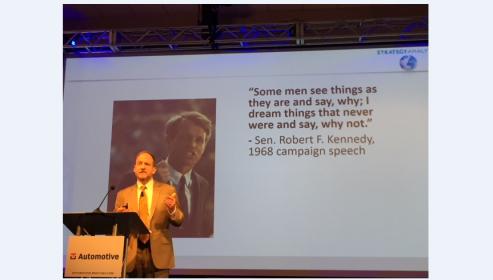 Keynoting the TU-Automotive event in Novi, Mich., last week on the 50th anniversary of the assassination of Senator Robert F. Kennedy I took the occasion to note the lofty visions to which Robert and his brother, President John F. Kennedy, aspired. We face our own challenges in the automotive industry today, with an annual global highway death toll of 1.25M. It is in the interest of mitigating that fatality rate that we pursue our own lofty objective of automating driving.
Keynoting the TU-Automotive event in Novi, Mich., last week on the 50th anniversary of the assassination of Senator Robert F. Kennedy I took the occasion to note the lofty visions to which Robert and his brother, President John F. Kennedy, aspired. We face our own challenges in the automotive industry today, with an annual global highway death toll of 1.25M. It is in the interest of mitigating that fatality rate that we pursue our own lofty objective of automating driving.
In my talk I cited President Kennedy’s sentiments, spoken at Rice University in 1962: “We choose to go to the Moon! We choose to go to the Moon in this decade and do the other things, not because they are easy, but because they are hard.”
There is no question that automating driving is hard. It is also expensive. As car makers look out over the range of changing vehicle ownership and usage behavior a red ocean of expensive, loss-producing opportunity emerges. From ride hailing to car sharing to electrification and autonomy, billions of dollars are being invested in startups, acquisitions and hiring sprees producing rivers of red ink.
At the same time, industry intruders from the tech community – most prominently Amazon, Apple, Alphabet and Alibaba (the A-Team) are circling ominously, licking their corporate chops at the opportunity to gobble up great chunks of the automotive and wider transportation industry. At stake are the hearts, minds and wallets of the driving and commuting public.
Of greatest concern to auto makers is the fact that this A-Team possesses the financial wherewithal to endure the flow of red ink and swim across the red ocean to achieve the objective: seizing control of the hard won customer relationships built upon more than 100 years of automobile manufacturing. The victory in this struggle may well be determined by something as simple as speech recognition in the form of the many digital assistants cropping up on mobile devices, in smart speakers and, now, coming to cars.
The A-Team made its first foray into customer ownership with smartphone integration in the form of the increasingly familiar CarPlay and Android Auto. Now Alexa, Google Voice, Siri, Cortana and others are coming to car dashboards. These systems have the ability to turn every car into a mobile search engine – with predictable results.
Standing in the path of these digital interlopers are Nuance Communications – with its hybrid natural language understanding technology – and a tiny startup called German Autolabs. German Autolabs is offering an over-the-top digital assistant – “Chris” – purpose built in cooperation with Nuance to serve the needs of drivers and passengers
Why is Chris so important? Because the A-Team has made it clear to auto makers that they won’t be segregating or shielding vehicle-based digital assistant users from broader customer aggregation activities. The drivers of cars who may use Alexa, Google Voice and the rest will be subject to the broader customer acquisition objectives of these external solution providers.
The A-Team is seeking to sell and service cars, if not actually manufacture them, and they want to manage vehicle ownership and usage behavior – a monetization opportunity ultimately representing trillions of dollars. If successful, car makers will be left swimming helplessly in their red ocean as the A-Team sails off into the sunset.
Only time will tell whether Chris can provide the critical differentiation and digital assistance infrastructure necessary to preserve auto industry customer relationships and connectivity. But without Chris, the traditional auto industry may be unable to swim across the red ocean rising around our ankles. The key to Kennedy’s vision, after all, wasn’t just getting TO the moon, it was also getting back FROM the moon.
Share this post via:





The Intel Common Platform Foundry Alliance